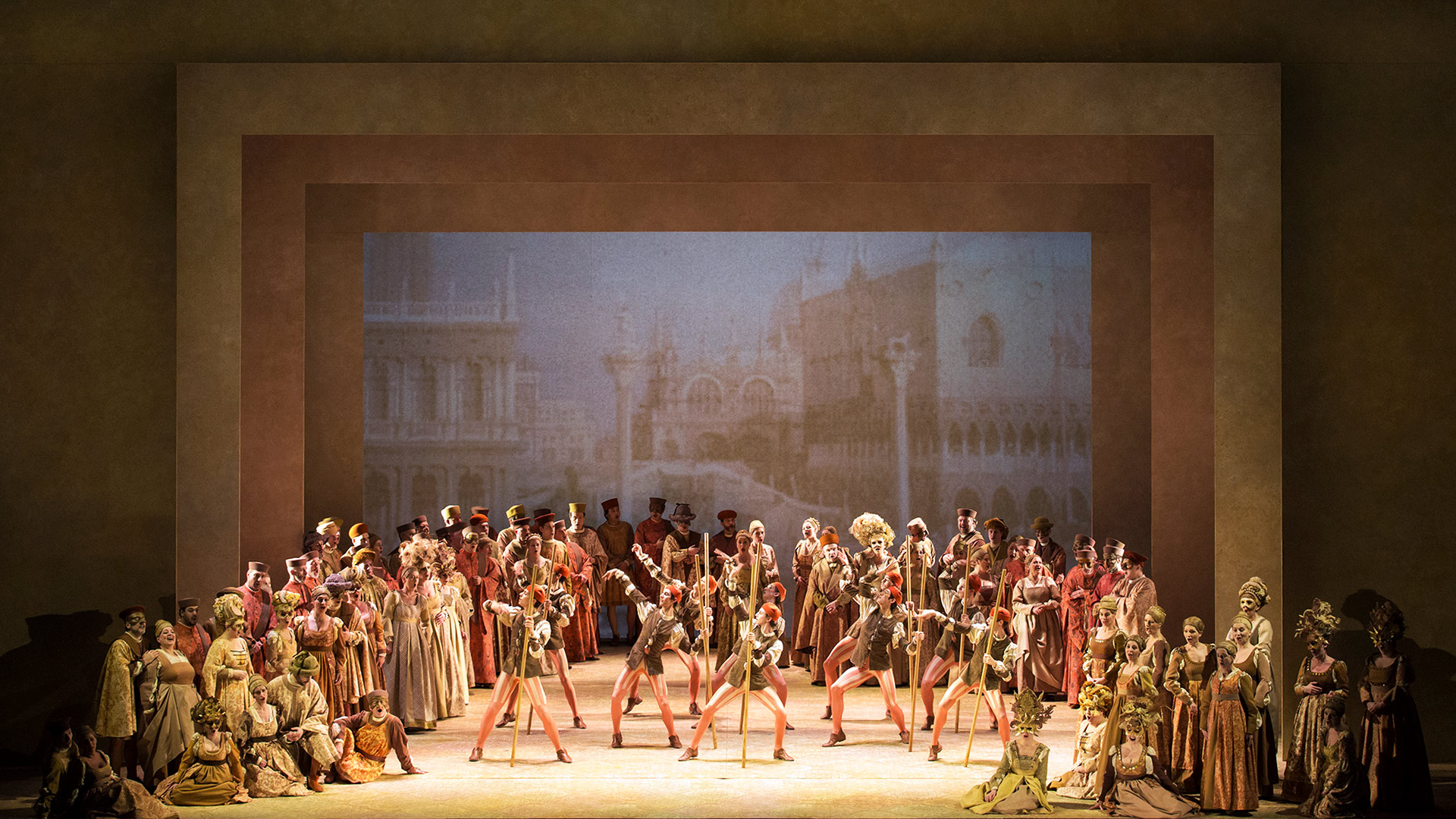Tragic opera in three acts
Music by Giuseppe Verdi
Libretto by Francesco Maria Piave, da Byron
PLAYBILL
Francesco Foscari
Franco Vassallo
Jacopo Foscari
Fabio Sartori
Lucrezia Contarini
Angela Meade
Jacopo Loredano
Antonio Di Matteo
Barbarigo
Saverio Fiore
Pisana
Marta Calcaterra
Fante
Alberto Angeleri
Servo del Doge
Filippo Balestra
Conductor
and orchestrator
Renato Palumbo
Director and set designer
Alvis Hermanis
Costume designer
Kristìne Jurjàne
Choreographer
Alla Sigalova
Lighting designer
Gleb Filshtinsky
Videos
Ineta Sipunova
Staging
Fondazione Teatro Carlo Felice di Genova
Orchestra, chorus and Technicians
of Opera Carlo Felice Genova
Chorusmaster
Claudio Marino Moretti
Ballet Training Foundation
Dance and Entertainment “For Dance” ETS
Staging director
Luciano Novelli
Stage musical director
Paloma Brito
Répétiteurs
Sirio Restani, Antonella Poli
Stage musical assistants
Andrea Gastaldo, Anna Maria Pascarella
other Choir Master
Patrizia Priarone
Lighting Master
Caterina Galiotto
Supertitle Master
Simone Giusto
Head of musical archives
Simone Brizio
Scenic director
Alessandro Pastorino
Vice scenic director
Sumireko Inu
Consolle supervisor
Andrea Musenich
Stage technicians foreman
Gianni Cois
Electrician foreman
Giuseppe Carbone
Tooling foreman
Tiziano Baradel
Audio/video foreman
Walter Ivaldi
Head of tailoring, shoemaking, make-up and wigs
Elena Pirino
Director’s assistant
Luca Baracchini
Video operator for choreographies
Irina Kashkova
Costume assistant
Alexandra Nikolaeva
Assistant lighting designer
Gianni Bertoli
Make-up and hair coordinator
Raul Ivaldi
Scenes, costumes and props
by Opera Carlo Felice
Footwear
C.T.C. Pedrazzoli
Wigs
Mario Audello
Supertitles
Prescott Studio
The opera in brief
by Ludovica Gelpi
In the early 1840s, Verdi was beginning to write a large number of operas at a faster pace than in the previous period. By then, Verdi was already a renowned and relatively established composer: he had performed five titles, four at Teatro La Scala and one opera at Teatro La Fenice. In March 1844, Ernani was staged in Venice. Just a month later, Verdi started composing I Due Foscari. It then began the period later know as the confined ‘years in jail’, when he wrote two or three operas per year consecutively.
With Ernani, Verdi had already decided to shift toward themes more centered upon the psychology of the characters, maintaining such a direction with I due Foscari, choosing the theatrical opera The two Foscari, by Byron, published in 1821, a “delicate and very pathetic” subject, which he worked on together with librettist Francesco Maria Piave. Byron was inspired by the figure of Franceso Foscari, doge of Venice from 1423 to 1457, drawing on his story with some minor changes. Both Byron’s text and Piave’s version present as central the theme of the conflict between duty and feeling.
The most in-depth psychological view is reserved to the protagonists, starting from Francesco Foscari, doge and father unable to prove his son’s innocence when he is accused of murder, obliged to follow the law while damaging himself. In turn, Jacopo is a character who shares some traits with the ideal, fallen romantic hero. Inextricably bound to his Venice and his family and falsely accused, on the one hand he tries to return, to convince his father, to find comfort in the hope of reuniting with his wife and children; on the other hand, he is the victim of very negative feelings and suffers the events around him without trying to shape his own fate. Likewise, his wife Lucrezia remains powerless in front of reality, following the unrevaling of the plot with growing desperation and without action. The counterpart to such a trio is the antagonistic figure of Jacopo Loredano, the advisor to the council Consiglio dei Dieci and arch-enemy of the Foscari. He is determined to take revenge on young Foscari, being the murder he was accused of the one of two members of his family. He is in fact the only character presenting no conflict: he eagerly wishes Jacopo’s exile and Francis’ deposition, acting accordingly with strength and determination and achieving an total victory over both of them.
The action is led by the antagonist, while the positive characters are dominated by such circumstances and appear to be living in an alternative, reflective dimension where they hope for the best but expect the worst. A fundamental problem in the musical transposition originates because of the very wide space occupied by the characters of Francesco, Jacopo and Lucrezia: a problem which Verdi notice while composing the opera. The almost total presence of the ‘unmoving protagonists’ renders such a Byronian drama fascinating, though not sufficiently various when it comes to its musicl transposition. There are not enough contrast elements, the general layout remains dark and tragic without any changes in register or surprising turns of events. Therefore, music confirms a still line that remain as such from the beginning to the end of the plot without any expressive variety. The result does not come near to the great achievements that have rendered Vierdi an immortal composer, even though I due Foscari contistutes a solid landmark in a searching process from orchestration to harmony that will bloom only after a few years.

